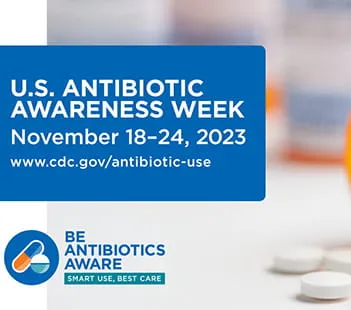November 20, 2023

U.S. Antibiotic Awareness Week (USAAW), Nov. 18-24, is held annually to recognize the importance of appropriate antibiotic use.
Many patients have a reported allergy to an antibiotic, with penicillin being the most reported antibiotic allergy. Some 10% of the population reports having a penicillin allergy, whereas fewer than 1% are truly allergic to penicillin. Giving your provider as much information about the allergy can help him/her determine which antibiotics would be safe to prescribe. Helpful information includes how old you were when the reaction occurred, what was the reaction that occurred, and what happened as a result of the reaction. Were you hospitalized, did you stop the antibiotic, or did you have to take medications to treat the reaction?
Antibiotic allergies can be serious, but there are many myths that should be debunked.
- Nausea, vomiting, diarrhea, headache are examples of antibiotic allergies – FALSE. These are common side effects of the antibiotic and are not usually reasons to avoid an antibiotic or have an antibiotic allergy listed in your medical chart.
- My family member has a penicillin allergy, so I should also avoid penicillin – FALSE. A family member having an allergy does not mean you will also be allergic.
- Once allergic, always allergic – FALSE. Many people who have an allergic reaction to an antibiotic as a child do not have that same allergy as an adult.
- Because I have an allergy to penicillin means I cannot take similar antibiotics such as cephalosporins – both TRUE and FALSE. A true allergy to penicillin may increase your risk of having a reaction to certain cephalosporins; however, the likelihood of this happening is much lower than previously thought. Additionally, most cephalosporins are safe for patients with a penicillin allergy.
Please discuss your antibiotic allergies with your provider or pharmacist.
Find more information about USAAW on the Centers for Disease Control and Prevention website
Denver Health Antibiotic Stewardship Program
Denver Health has an Antibiotic Stewardship Program, which consists of a team of physicians and pharmacists who work with the health care workers at Denver Health to help them make the best decisions about prescribing antibiotics for you and your family. This team has developed and provided many resources to your providers so they can make the best decisions about when it is appropriate to prescribe an antibiotic, which antibiotic is the best for your type of infection, what how much is most appropriate for you and for how long you should be treated.
Denver Health has been named an Antimicrobial Stewardship Center of Excellence by the Infectious Disease Society of America.

